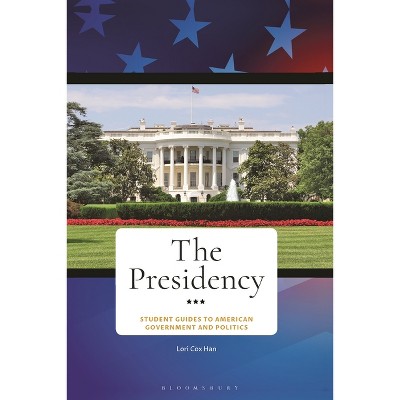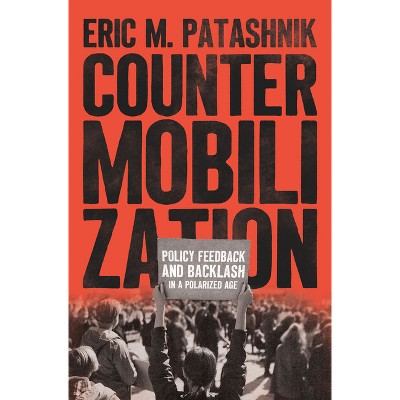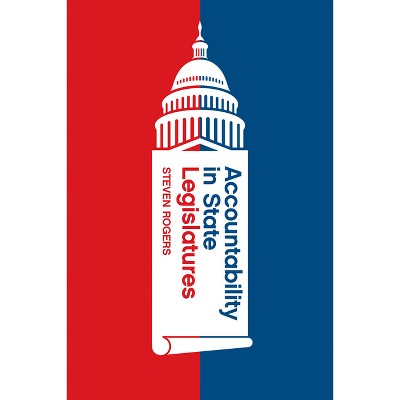Sponsored

Power Shifts - (Chicago Studies in American Politics) by John A Dearborn (Hardcover)
$113.00
In Stock
Eligible for registries and wish lists
Sponsored
About this item
Highlights
- That the president uniquely represents the national interest is a political truism, yet this idea has been transformational, shaping the efforts of Congress to remake the presidency and testing the adaptability of American constitutional government.
- About the Author: John A. Dearborn is assistant professor of political science and the Carolyn T. and Robert M. Rogers Dean's Faculty Fellow at Vanderbilt University.
- 368 Pages
- Political Science, American Government
- Series Name: Chicago Studies in American Politics
Description
About the Book
The emergence of the modern presidency in the first half of the twentieth century transformed the American government. But surprisingly, presidents were not the primary driving force of this change--it was Congress. Through a series of statutes, lawmakers endorsed presidential leadership in the legislative process and augmented the chief executive's organizational capacities. But why did Congress grant presidents this power? In Power Shifts, John A. Dearborn shows that legislators acted on the idea of presidential representation. Congress subordinated its own claims to stand as the nation's primary representative institution and designed reforms that assumed the president, selected by the country rather than states or districts, was the superior steward of national interest. In the process, Congress recast the nation's chief executive as its chief representative. As Dearborn demonstrates, the full extent to which Congress's reforms rested on the idea of presidential representation was revealed when that notion's validity was thrown into doubt. In the 1970s, Congress sought to restore its place in a rebalanced system, but legislators also found that their earlier success at institutional reinvention constrained their efforts to reclaim authority. Chronicling the evolving relationship between the presidency and Congress across a range of policy areas, Power Shifts exposes a fundamental dilemma in an otherwise proud tradition of constitutional adaptationBook Synopsis
That the president uniquely represents the national interest is a political truism, yet this idea has been transformational, shaping the efforts of Congress to remake the presidency and testing the adaptability of American constitutional government. The emergence of the modern presidency in the first half of the twentieth century transformed the American government. But surprisingly, presidents were not the primary driving force of this change--Congress was. Through a series of statutes, lawmakers endorsed presidential leadership in the legislative process and augmented the chief executive's organizational capacities. But why did Congress grant presidents this power? In Power Shifts, John A. Dearborn shows that legislators acted on the idea that the president was the best representative of the national interest. Congress subordinated its own claims to stand as the nation's primary representative institution and designed reforms that assumed the president was the superior steward of all the people. In the process, Congress recast the nation's chief executive as its chief representative. As Dearborn demonstrates, the full extent to which Congress's reforms rested on the idea of presidential representation was revealed when that notion's validity was thrown into doubt. In the 1970s, Congress sought to restore its place in a rebalanced system, but legislators also found that their earlier success at institutional reinvention constrained their efforts to reclaim authority. Chronicling the evolving relationship between the presidency and Congress across a range of policy areas, Power Shifts exposes a fundamental dilemma in an otherwise proud tradition of constitutional adaptation.Review Quotes
"Dearborn provides a very insightful, persuasive, and engaging account of some of the most important congressional activity of the 20th century. Through a well-developed argument and an excellent qualitative research design, Dearborn shows that these institutional changes were shaped by prevailing ideas about presidential and congressional decision-making."-- "Congress & The Presidency"
"In his remarkable book, Dearborn provides copious primary source evidence to support his thesis, and each of the case studies presents new and important information for understanding one major facet of the expansion of presidential power."-- "Perspectives on Politics"
"Power Shifts: Congress and Presidential Representation is an ambitious and impressive exploration of 'presidential representation, ' the idea that the president will lead in a manner that is best for the entire country because the president represents the whole nation... Throughout the book, Dearborn revisits major congressional policy choices and explains what role presidential representation may have played. He consults a wide range of evidence to support his arguments,
including archival documents from several collections."-- "Political Science Quarterly"
"A book for our age and for ages to come, Power Shifts shows how America's presidential edifice has been built and sustained by Congress's twentieth-century wrestling with presidential representation: the metaphor of a single nation anointing a single person. Along the way, Dearborn offers a fresh narrative of the modern executive and a forceful reminder that the life of ideas in politics rests in the institutional changes that embody them."--Daniel Carpenter, Harvard University
"Read narrowly, Power Shifts shows how notions of 'presidential representation' periodically convinced members of Congress to confer new authority and responsibility upon the presidency. More deeply, though, this book interrogates the role of ideas--as distinct from interests--in shaping political debates about institutional reform. Just behind all the partisan wrangling over executive power are long-standing disagreements about the possibilities of presidential leadership. Dearborn reveals their elements and significance for all to see. This book is simply magnificent."--William G. Howell, University of Chicago
"John A. Dearborn's Power Shifts is one of the best books on American political development that I have read in a very long time. His research is well-written, meticulous, and keenly sensitive to the kind of historical and documentary evidence necessary to support his causal claims that the major reforms of the presidency in the 20th century were a function of the power of an idea, presidential representation. Power Shifts goes beyond telling a good story; it is social science at its best. I recommend this book to all interested in American political development, the presidency, the power of ideas, and representation theory; quite a broad audience."-- "Party Politics"
"In Power Shifts, John Dearborn provides a very insightful, persuasive, and engaging account of some of the most important congressional activity of the 20th century-namely, legislative efforts to expand or rein in presidential authority and capacity in key policy areas. . . . Through a well-developed argument and an excellent qualitative research design, Dearborn shows that these institutional changes were shaped by prevailing ideas about presidential and congressional decision-making. . . . Dearborn marshals a remarkable array of evidence, including hundreds of contemporaneous statements by members of Congress and opinion leaders, to show convincingly that ideas have shaped the development of the institutional presidency and the power of the two branches."-- "Congress & the Presidency"
"This is a propulsive book. . . and Dearborn keeps the reader engaged through fascinating details about legislation that Congress passes in the midst of the 20th century that not only sets up policy outcomes but also provides the president with the power to create those outcomes."-- "New Books Network"
About the Author
John A. Dearborn is assistant professor of political science and the Carolyn T. and Robert M. Rogers Dean's Faculty Fellow at Vanderbilt University. He is coauthor of Phantoms of a Beleaguered Republic: The Deep State and the Unitary Executive.Dimensions (Overall): 9.0 Inches (H) x 6.0 Inches (W) x .81 Inches (D)
Weight: 1.4 Pounds
Suggested Age: 22 Years and Up
Number of Pages: 368
Genre: Political Science
Sub-Genre: American Government
Series Title: Chicago Studies in American Politics
Publisher: University of Chicago Press
Theme: Executive Branch
Format: Hardcover
Author: John A Dearborn
Language: English
Street Date: September 27, 2021
TCIN: 1006097834
UPC: 9780226797663
Item Number (DPCI): 247-42-4515
Origin: Made in the USA or Imported
If the item details aren’t accurate or complete, we want to know about it.
Shipping details
Estimated ship dimensions: 0.81 inches length x 6 inches width x 9 inches height
Estimated ship weight: 1.4 pounds
We regret that this item cannot be shipped to PO Boxes.
This item cannot be shipped to the following locations: American Samoa (see also separate entry under AS), Guam (see also separate entry under GU), Northern Mariana Islands, Puerto Rico (see also separate entry under PR), United States Minor Outlying Islands, Virgin Islands, U.S., APO/FPO
Return details
This item can be returned to any Target store or Target.com.
This item must be returned within 90 days of the date it was purchased in store, shipped, delivered by a Shipt shopper, or made ready for pickup.
See the return policy for complete information.
Trending Non-Fiction

$15.68
Buy 2, get 1 free select books
4.7 out of 5 stars with 182 ratings

$19.31
was $20.98 New lower price
Buy 2, get 1 free select books
4.1 out of 5 stars with 54 ratings

$19.58
MSRP $29.00
Buy 2, get 1 free select books
4.7 out of 5 stars with 11 ratings

$4.59
MSRP $7.99
Buy 2, get 1 free select books
4.8 out of 5 stars with 116 ratings

$6.20
MSRP $10.95
Buy 2, get 1 free select books
4.8 out of 5 stars with 33 ratings

$7.09
MSRP $9.99
Buy 2, get 1 free select books
4.9 out of 5 stars with 45 ratings





